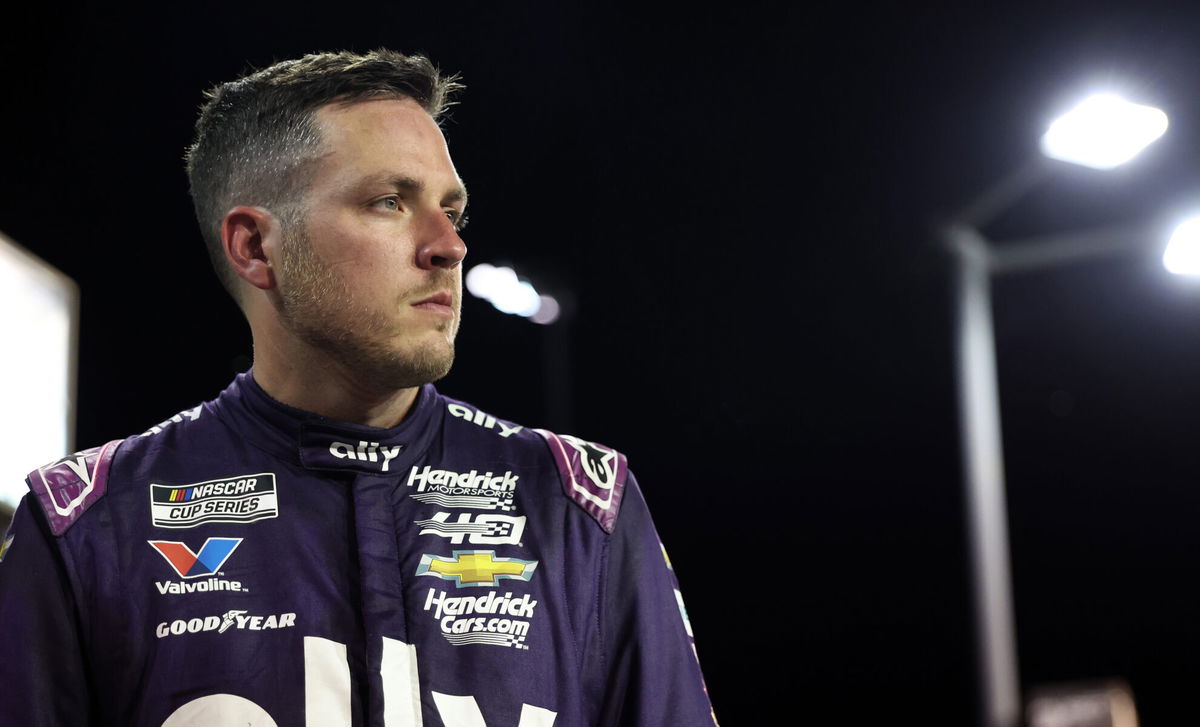
Getty
DARLINGTON, SOUTH CAROLINA – SEPTEMBER 01: Alex Bowman, driver of the #48 Ally Chevrolet, looks on after the NASCAR Cup Series Cook Out Southern 500 at Darlington Raceway on September 01, 2024 in Darlington, South Carolina. (Photo by Meg Oliphant/Getty Images)

Getty
DARLINGTON, SOUTH CAROLINA – SEPTEMBER 01: Alex Bowman, driver of the #48 Ally Chevrolet, looks on after the NASCAR Cup Series Cook Out Southern 500 at Darlington Raceway on September 01, 2024 in Darlington, South Carolina. (Photo by Meg Oliphant/Getty Images)

Getty
DARLINGTON, SOUTH CAROLINA – SEPTEMBER 01: Alex Bowman, driver of the #48 Ally Chevrolet, looks on after the NASCAR Cup Series Cook Out Southern 500 at Darlington Raceway on September 01, 2024 in Darlington, South Carolina. (Photo by Meg Oliphant/Getty Images)

Getty
DARLINGTON, SOUTH CAROLINA – SEPTEMBER 01: Alex Bowman, driver of the #48 Ally Chevrolet, looks on after the NASCAR Cup Series Cook Out Southern 500 at Darlington Raceway on September 01, 2024 in Darlington, South Carolina. (Photo by Meg Oliphant/Getty Images)
Many know that deliberate moves through radio talk could mean a NASCAR penalty, as officials closely monitor team communications to prevent any kind of unfair manipulation. Despite this, or rather due to this, HMS driver Alex Bowman’s held-up speed and radio talk came under the spotlight.
Watch What’s Trending Now!
In the final laps, when Bowman found himself chasing Trackhouse’s Ross Chastain, who was defending his playoff with his life, the former’s radio chatter suggested caution. “Easy with it. Take care of your tires here,” and later, “Take care of your tires.” These repeated instructions seemed routine, but in this critical context, they could have delivered a message.
After a thorough review, NASCAR has scheduled a meeting after announcing its decision.
NASCAR’s decision
Insider Steve Taranto tweeted, “This week’s Hauler Talk confirmed that NASCAR reviewed both Cole Custer & Alex Bowman’s radio comms in the final laps at the Roval and did not feel what was said rose to the level where a penalty was necessary.”
Alex Bowman surely escaped this one, and so did Cole Custer, whose communications had gathered similar interest from the officials. Managing Director Mike Forde said, “If we do see something or hear something we don’t like, we are going to step in, which we’ve have done now several times.”
But it didn’t end here. This incident has prompted NASCAR to schedule a meeting with all teams. Reason? To remind them of the seriousness of the issue, and that a leeway like this might probably not be given again.
This week’s Hauler Talk confirmed that NASCAR reviewed both Cole Custer & Alex Bowman’s radio comms in the final laps at the Roval and did not feel what was said rose to the level where a penalty was necessary.
However, NASCAR plans to meet with teams this week and remind them… https://t.co/XdOC227CoA
— Steven Taranto (@STaranto92) October 8, 2025
The stakes in the Round of 8 get even higher which is why NASCAR feels this is an important moment to remind teams that race manipulation is taken seriously. “Let’s not put yourselves or ourselves in jeopardy here,” they said.
Forde also noted the new reality for teams under a microscope, saying, “The beauty of social media in this era is we have thousands of officials sitting at home and reviewing HBO Max cameras, and listening to radio transmissions.”
NASCAR’s awareness of fan and media scrutiny has made even subtle instructions a potential talking point. These always have the risk of being misinterpreted, especially in tight situations like these. It is a lesson teams cannot afford to ignore as they navigate the closing races of the season.
With this decision, NASCAR is sending a clear message. Playoff races are meant to be earned on the track. “Fans should be coming to the race track and expecting a straight-up race where each position is fought for as hard as possible, especially at the end of a race,” Forde stated.
The Charlotte Roval incident reinforces the fine line teams walk between strategy and manipulation. However, not everybody has been in favor of NASCAR’s rulings on the matter. Recently, Dale Jr. addressed these decisions.
Dale Earnhardt Jr. gives his verdict on NASCAR radio policing
In a recent episode of The Dale Jr. Download, Dale Earnhardt Jr. expressed his concerns over NASCAR’s radio policing following the Charlotte race. He highlighted incidents where teams were penalized for merely discussing point standings over the radio. According to him, he finds no problems in a spotter sharing a points situation.
“And honestly, there’s all these videos. Was Cole Custer not trying to pass the 22? Was Bowman not trying to race the 1? Who cares at this point?” he said. “Let whatever happen… as long as it ain’t super egregious.”
Dale Jr. argued that as long as team communications don’t lead to overt race manipulation, they should be permissible. For him, there had to be clear signs of intentionally causing a caution or deliberately slowing down. He cited historical instances, like Harry Gant’s 1993 Talladega victory with assistance from Rick Mast, as examples where strategic collaboration was accepted and celebrated.
He further criticized NASCAR’s current approach, which feels like the governing body is over-policing and creating an environment of fear among teams. Dale Jr. thought that this could be detrimental. For him, teams should be trusted to make informed decisions without the constant threat of penalties for discussing race scenarios.
With the final stretch of the season in action, Dale Jr. called for a more nuanced understanding of team communications. He advocated for a system that distinguishes between strategic discussions and actual race manipulation.



